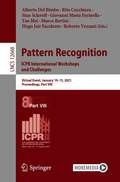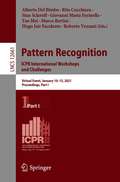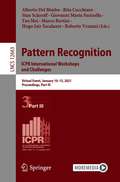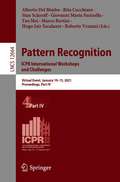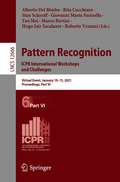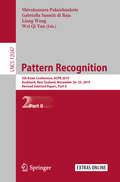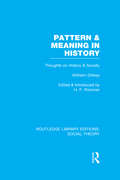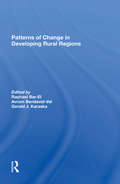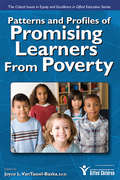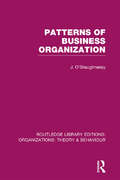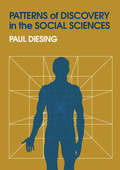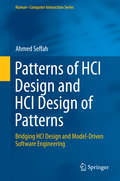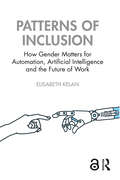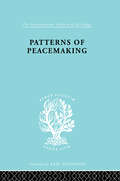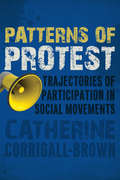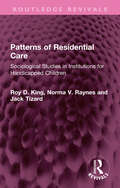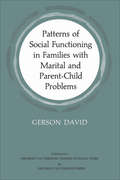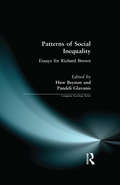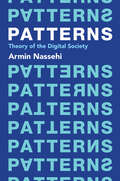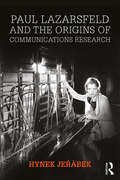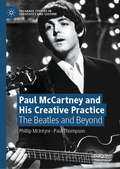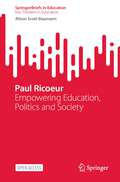- Table View
- List View
Pattern Recognition. ICPR International Workshops and Challenges: Virtual Event, January 10-15, 2021, Proceedings, Part VIII (Lecture Notes in Computer Science #12668)
by Marco Bertini Giovanni Maria Farinella Hugo Jair Escalante Alberto Del Bimbo Stan Sclaroff Rita Cucchiara Tao Mei Roberto VezzaniThis 8-volumes set constitutes the refereed of the 25th International Conference on Pattern Recognition Workshops, ICPR 2020, held virtually in Milan, Italy and rescheduled to January 10 - 11, 2021 due to Covid-19 pandemic. The 416 full papers presented in these 8 volumes were carefully reviewed and selected from about 700 submissions. The 46 workshops cover a wide range of areas including machine learning, pattern analysis, healthcare, human behavior, environment, surveillance, forensics and biometrics, robotics and egovision, cultural heritage and document analysis, retrieval, and women at ICPR2020.
Pattern Recognition. ICPR International Workshops and Challenges: Virtual Event, January 10–15, 2021, Proceedings, Part I (Lecture Notes in Computer Science #12661)
by Marco Bertini Giovanni Maria Farinella Hugo Jair Escalante Alberto Del Bimbo Stan Sclaroff Rita Cucchiara Tao Mei Roberto VezzaniThis 8-volumes set constitutes the refereed of the 25th International Conference on Pattern Recognition Workshops, ICPR 2020, held virtually in Milan, Italy and rescheduled to January 10 - 11, 2021 due to Covid-19 pandemic. The 416 full papers presented in these 8 volumes were carefully reviewed and selected from about 700 submissions. The 46 workshops cover a wide range of areas including machine learning, pattern analysis, healthcare, human behavior, environment, surveillance, forensics and biometrics, robotics and egovision, cultural heritage and document analysis, retrieval, and women at ICPR2020.
Pattern Recognition. ICPR International Workshops and Challenges: Virtual Event, January 10–15, 2021, Proceedings, Part III (Lecture Notes in Computer Science #12663)
by Marco Bertini Giovanni Maria Farinella Hugo Jair Escalante Alberto Del Bimbo Stan Sclaroff Rita Cucchiara Tao Mei Roberto VezzaniThis 8-volumes set constitutes the refereed of the 25th International Conference on Pattern Recognition Workshops, ICPR 2020, held virtually in Milan, Italy and rescheduled to January 10 - 11, 2021 due to Covid-19 pandemic. The 416 full papers presented in these 8 volumes were carefully reviewed and selected from about 700 submissions. The 46 workshops cover a wide range of areas including machine learning, pattern analysis, healthcare, human behavior, environment, surveillance, forensics and biometrics, robotics and egovision, cultural heritage and document analysis, retrieval, and women at ICPR2020.
Pattern Recognition. ICPR International Workshops and Challenges: Virtual Event, January 10–15, 2021, Proceedings, Part IV (Lecture Notes in Computer Science #12664)
by Marco Bertini Giovanni Maria Farinella Hugo Jair Escalante Alberto Del Bimbo Stan Sclaroff Rita Cucchiara Tao Mei Roberto VezzaniThis 8-volumes set constitutes the refereed of the 25th International Conference on Pattern Recognition Workshops, ICPR 2020, held virtually in Milan, Italy and rescheduled to January 10 - 11, 2021 due to Covid-19 pandemic. The 416 full papers presented in these 8 volumes were carefully reviewed and selected from about 700 submissions. The 46 workshops cover a wide range of areas including machine learning, pattern analysis, healthcare, human behavior, environment, surveillance, forensics and biometrics, robotics and egovision, cultural heritage and document analysis, retrieval, and women at ICPR2020.
Pattern Recognition. ICPR International Workshops and Challenges: Virtual Event, January 10–15, 2021, Proceedings, Part VI (Lecture Notes in Computer Science #12666)
by Marco Bertini Giovanni Maria Farinella Hugo Jair Escalante Alberto Del Bimbo Stan Sclaroff Rita Cucchiara Tao Mei Roberto VezzaniThis 8-volumes set constitutes the refereed of the 25th International Conference on Pattern Recognition Workshops, ICPR 2020, held virtually in Milan, Italy and rescheduled to January 10 - 11, 2021 due to Covid-19 pandemic. The 416 full papers presented in these 8 volumes were carefully reviewed and selected from about 700 submissions. The 46 workshops cover a wide range of areas including machine learning, pattern analysis, healthcare, human behavior, environment, surveillance, forensics and biometrics, robotics and egovision, cultural heritage and document analysis, retrieval, and women at ICPR2020.
Pattern Recognition: 5th Asian Conference, ACPR 2019, Auckland, New Zealand, November 26–29, 2019, Revised Selected Papers, Part II (Lecture Notes in Computer Science #12047)
by Liang Wang Wei Qi Yan Shivakumara Palaiahnakote Gabriella Sanniti di BajaThis two-volume set constitutes the proceedings of the 5th Asian Conference on ACPR 2019, held in Auckland, New Zealand, in November 2019. The 9 full papers presented in this volume were carefully reviewed and selected from 14 submissions. They cover topics such as: classification; action and video and motion; object detection and anomaly detection; segmentation, grouping and shape; face and body and biometrics; adversarial learning and networks; computational photography; learning theory and optimization; applications, medical and robotics; computer vision and robot vision; pattern recognition and machine learning; multi-media and signal processing and interaction.
Pattern and Meaning in History: Wilhelm Dilthey's Thoughts on History and Society (Routledge Library Editions: Social Theory Ser.)
by Wilhelm Dilthey H. P. Rickman'One may state Dilthey's significance in most general fashion by characterizing his work as the first thorough-going and sophisticated confrontation of history with positivism and natural science. Dilthey's sweep was universal: he strove to reduce to order the multifarious realms of knowledge, the conflicting traditions of cultural study, that he had embraced. Thus Dilthey laid out a program that no mortal – and certainly no one whose mind had been formed in the third quarter of the nineteenth century – could hope to bring to completion. Yet despite its inconclusiveness, Dilthey's work exerted enormous influence. The distinction he had drawn between natural and cultural science became standard for historians and, to a lesser extent, for social scientists also. After Dilthey historians no longer needed to apologize for the "unscientific" character of their discipline: they understood why its methods could never be quite the same as those of natural science. And the contemporary tradition of intellectual history grew naturally out of Dilthey's teaching.' – H. Stuart Hughes
Patterns Of Change In Developing Rural Regions
by Avrom Bendavid-Val Raphael Bar-El Dafna Schwartz Gerald KaraskaDevelopment specialists often overlook the feet that the towns of a rural region play as essential a role in the region's economy as does agriculture, and they design and implement broad strategies without due recognition of the unique and dynamic character of each individual region. Proper analysis requires consideration of the changing nature of rural regions and the principal agents of change. The contributors to this volume argue that development strategists should focus on processes rather than on products by taking the nonfarm aspects, as well as the farm aspects, of rural development into account and by recognizing that land, labor, water, and technology do not alone lead to balanced regional and agricultural development. The analytical approaches presented in this book incorporate wide-ranging variables from the urban space of rural regions—markets, towns, service industries, and organizations—that have major impacts on the rural regional economy. These methodologies aim at improving rural regional development processes.
Patterns and Profiles of Promising Learners from Poverty
by Joyce Vantassel-BaskaPatterns and Profiles of Promising Learners From Poverty provides a comprehensive review of the issues surrounding the education and inclusion of promising students from poverty in gifted and talented programs.
Patterns of Business Organization: Organizations: Patterns Of Business Organization (Routledge Library Editions: Organizations)
by John O'ShaughnessyThis book is a successor to the earlier and widely-used Business Organization. In this book the author helps the student to develop his or her own critical and conceptual understanding of the subject. As the author reviews the various approaches – classical, human relations, behavioural science, systems and contingency theories – he shows that none of them offers a simple progression from error to truth, but that all of them combine to contribute to a broader view of the field. The final chapter summarizes the author’s viewpoint, applying the different approaches to a particular case study.
Patterns of Discovery in the Social Sciences
by Paul DiesingSocial scientists are often vexed because their work does not satisfy the criteria of "scientific" methodology developed by philosophers of science and logicians who use the natural sciences as their model. In this study, Paul Diesing defines science not by reference to these arbitrary norms delineated by those outside the field but in terms of norms implicit in what social scientists actually do in their everyday work.
Patterns of HCI Design and HCI Design of Patterns
by Ahmed SeffahAs interactive systems are quickly becoming integral to our everyday lives, this book investigates how we can make these systems, from desktop and mobile apps to more wearable and immersive applications, more usable and maintainable by using HCI design patterns. It also examines how we can facilitate the reuse of design practices in the development lifecycle of multi-devices, multi-platforms and multi-contexts user interfaces. Effective design tools are provided for combining HCI design patterns and User Interface (UI) driven engineering to enhance design whilst differentiating between UI and the underlying system features. Several examples are used to demonstrate how HCI design patterns can support this decoupling by providing an architectural framework for pattern-oriented and model-driven engineering of multi-platforms and multi-devices user interfaces. Patterns of HCI Design and HCI Design of Patterns is for students, academics and Industry specialists who are concerned with user interfaces and usability within the software development community.
Patterns of Inclusion: How Gender Matters for Automation, Artificial Intelligence and the Future of Work
by Elisabeth KelanIt is widely presumed that digitalisation, automation and artificial intelligence (AI) shape the future of work; yet, gender is rarely considered in those debates. This ground-breaking book, written by a leading thinker on gender, inclusion and organisations, is based on in-depth research to show which patterns of gender and digitalisation emerge. By weaving these different patterns together, is it possible to understand the dynamic and complex ways gender and digitalisation intertwine in the work context?The book highlights how futures of work are imagined between automation and augmentation: it shows which tasks are expected to be done by machines, and where humans are expected to have a competitive advantage. The book showcases how algorithmic bias is constructed as ultimately fixable, and analyses in/visibilities in AI production processes. Above all, the book shows how patterns relating to gender and inclusion are shaped and could be re-shaped.This innovative book provides a stimulating and provocative read for those who are interested in how automation and AI shape the future of work in regard to gender and what this means for inclusion.
Patterns of Peacemaking (International Library of Sociology)
by David Thomson E. Meyer A. BriggsThis is Volume XIII of eighteen in a series on Political Sociology. Originally published in 1945, this books makes a systematic survey and analysis, as objective as possible, of the tendencies most likely to govern peace-making. The authors intended to avoid making any specific recommendations of their own as to how the labours of peace-making should be undertaken, and to confine themselves to a study of how they were likely to be undertaken in the light of past experience, contemporary proposals, and the present alignment of political powers in the world. In the process of study, discussion and writing, all three authors arrived at certain more definite conclusions. At the same time, the course of events and the increasingly clear trend of official policies seemed to justify more positive assertions and more constructive suggestions than had at first been thought possible. The book, therefore, takes its present hybrid form: of systematic analysis carried forward to certain statements and even recommendations.
Patterns of Protest
by Catherine Corrigall-BrownAsked to name an activist, many people think of someone like Cesar Chavez or Rosa Parks—someone uniquely and passionately devoted to a cause. Yet, two-thirds of Americans report having belonged to a social movement, attended a protest, or engaged in some form of contentious political activity. Activism, in other words, is something that the vast majority of people engage in. This book examines these more common experiences to ask how and when people choose to engage with political causes. Corrigall-Brown reveals how individual characteristics and life experiences impact the pathway of participation, illustrating that the context and period in which a person engages are critical. This is the real picture of activism, one in which many people engage, in a multitude of ways and with varying degrees of continuity. This book challenges the current conceptualization of activism and pushes us to more systematically examine the varying ways that individuals participate in contentious politics over their lifetimes.
Patterns of Residential Care: Sociological Studies in Institutions for Handicapped Children (Routledge Revivals)
by Jack Tizard Roy D. King Norma V. RaynesOriginally published in 1971, this title describes a series of studies dealing with the upbringing of children in residential institutions. Most work has been carried out in institutions for children with learning disabilities, although units caring for able but deprived children and children with physical disabilities have also been examined. The investigations have been concerned with the detailed nature of different institutional environments – that is, the routine patterns of daily life in hospital wards, hostels and cottages of children’s homes – rather than with the effects of specific child-rearing practices upon the intellectual, emotional and social development of the children. The more precise delineation of ‘the environment’ is an essential step towards the evaluation of residential services and the interpretation of their effects upon those who use them, yet this is an area which had received little systematic attention from social scientists at the time. This book is a re-issue originally published in 1971. The language used is a reflection of its era and no offence is meant by the Publishers to any reader by this re-publication.
Patterns of Social Functioning in Families with Marital and Parent-Child Problems
by Gerson DavidThe work reported in this book represents the first attempt to study a sample of client families with marital and parent-child problems using a systematic framework based on role-theory. The findings of the study are important and made more so by the consistency of the framework: the dimensions of family behaviour can be accurately studied because the techniques of observation used are constant. This work, conducted under the auspices of the Toronto Family Diagnosis Project, School of Social Work at the University of Toronto, is an impressive contribution to two areas of social work: it offers new observations regarding family life that will be of particular interest to professionals and researchers in the field of family and child welfare, and its technical framework will be of interest to all social workers.
Patterns of Social Inequality: Essays for Richard Brown (Longman Sociology Series)
by Huw Beynon Pandeli GlavanisWritten by a group of the UK's leading Sociologists, this book covers in one volume all of the themes central to an understanding of contemporary British Society. Essays provide an historical overview of such topics as class, gender, work, ethnicity and community but also make a theoretical and substantive contribution to current debates.
Patterns: Theory of the Digital Society
by Armin NassehiWe are inclined to assume that digital technologies have suddenly revolutionized everything – including our relationships, our forms of work and leisure, and even our democracies – in just a few years. Armin Nassehi puts forward a new theory of digital society that turns this assumption on its head. Rather than treating digital technologies as an independent causal force that is transforming social life, he asks: what problem does digitalization solve? When we pose the question in this way, we can see, argues Nassehi, that digitalization helps societies to deal with and reduce complexity by using coded numbers to process information. We can also see that modern societies had a digital structure long before computer technologies were developed – already in the nineteenth century, for example, statistical pattern recognition technologies were being used in functionally differentiated societies in order to recognize, monitor and control forms of human behaviour. Digital technologies were so successful in such a short period of time and were able to penetrate so many areas of society so quickly precisely because of a pre-existing sensitivity that prepared modern societies for digital development. This highly original book lays the foundations for a theory of the digital society that will be of value to everyone interested in the growing presence of digital technologies in our lives.
Patty's Got a Gun: Patricia Hearst in 1970s America
by William GraebnerPatty Hearst's life changed abruptly at 9 p.m., February 4, 1974, when her fiancé , philosophy graduate student Steven Weed, opened the front door of their Berkeley, California, apartment. Two armed men and a woman, members of the Symbionese Liberation Army, pushed their way in. "Bitch," one of them said to Patty, "better be quiet, or we'll blow your head off." In less than three minutes, Patty, wearing only a blue bathrobe, had been gagged, blindfolded, and, her hands bound, dragged through the living room, struck in the face with a rifle butt, and forced into the trunk of a car. She had been kidnapped.
Paul Hanly Furfey: Priest, Scientist, Social Reformer (Catholic Practice in North America)
by Nicholas K. RademacherNicholas Rademacher’s book is meticulously researched and clearly written, shedding new light on Monsignor Paul Hanly Furfey’s life by drawing on Furfey’s copious published material and substantial archival deposit. Paul Hanly Furfey (1896–1992) is one of U.S. Catholicism’s greatest champions of peace and social justice. He and his colleagues at The Catholic University of America offered a revolutionary view of the university as a center for social transformation, not only in training students to be agents for social change but also in establishing structures which would empower and transform the communities that surrounded the university. In part a response to the Great Depression, their social settlement model drew on the latest social scientific research and technique while at the same time incorporating principles they learned from radical Catholics like Dorothy Day and Catherine de Hueck Doherty. Likewise, through his academic scholarship and popular writings, Furfey offered an alternative vision of the social order and identified concrete steps to achieve that vision. Indeed, Furfey remains a compelling exemplar for anyone who pursues truth, beauty, and justice, especially within the context of higher education and the academy.Leaving behind an important legacy for Catholic sociology, Furfey demonstrated how to balance liberal, radical, and revolutionary social thought and practice to elicit new approaches to social reform.
Paul Lazarsfeld and the Origins of Communications Research
by Hynek JeřábekThe manuscript discusses the early days of communication research, explicitly the first works of Paul Lazarsfeld’s radio and media research in Vienna, Newark, NJ, Princeton and New York during the years between the early 1930s, and the end of the 1940s. Lazarsfeld’s Viennese radio research, especially the world’s first extensive audience research – RAVAG study (1931) – is entirely new information for English speaking scholars. The book shows the details of Lazarsfeld’s methodological reasoning in his projects in the field of communication. The book also presents the research institutes that Lazarsfeld founded in Vienna in 1931, from Newark Center in New Jersey (1935) to Princeton Office of Radio Research in 1937, and up to the foundation of Lazarsfeld’s famous BASR at Columbia University in New York in the 1940s. The monograph shows how important Lazarsfeld’s first studies were for the future development of communication.
Paul McCartney and His Creative Practice: The Beatles and Beyond (Palgrave Studies in Creativity and Culture)
by Paul Thompson Phillip McIntyreThis book provides fresh insight into the creative practice developed by Paul McCartney over his extended career as a songwriter, record producer and performing musician. It frames its examination of McCartney’s work through the lens of the systems model of creativity developed by Mihaly Csikszentmihalyi and combines this with the research work of Pierre Bourdieu. This systems approach is built around the basic structures of idiosyncratic agents, like McCartney himself, and the choices he has made as a creative individual. It also locates his work within social fields and cultural domains, all crucial aspects of the creative system that McCartney continues to be immersed in. Using this tripartite system, the book includes analysis of McCartney’s creative collaborations with musicians, producers, artists and filmmakers and provides a critical analysis of the Romantic myth which forms a central tenet of popular music. This engaging work will have interdisciplinary appeal to students and scholars of the psychology of creativity, popular music, sociology and cultural studies.
Paul O'Grady's Country Life: Heart-warming and hilarious tales from Paul
by Paul O'GradyTHE SUNDAY TIMES BESTSELLERA fascinating and hilarious glimpse into Paul's life at home in the country with his animalsPaul O'Grady's Country Life for the first time gives a glimpse into the home life of one of Britain’s best loved stars, alongside the animals he adores. Sometimes rural idyll, sometimes hell on earth, Paul’s life in rural Kent has been shared over the years with some very vocal pigs, a mad cow, various rescued barn owls, the world’s most sadistic geese and Christine the psychotic sheep – among many other animal waifs and strays. And of course Paul tells the stories of the dogs in his life – including the tiny chihuahua/Jack Russell cross with Napoleonic ambitions, Eddie, Miss Olga, Bullseye, Louis, Boycie and, of course, Buster, the greatest canine star since Lassie. In addition, Paul shares some of his favourite recipes, explores country lore and superstitions, and extols the benefits of growing your own vegetables, herbs and fruit.This is a warts-and-all account of country living, as far removed from the bright lights of celebrity as you could ever imagine. The trials and tribulations Paul experienced on moving to deepest darkest Kent as a dyed-in-the-wool city dweller are every bit as hilarious and eventful as you would think. He had a lot of new skills to learn, and fast: everything from how to churn your own butter and how to birth a lamb to the best way to lure a cow out of your kitchen while naked from the waist down.Brilliantly funny and full of classic stories, Paul O’Grady’s Country Life is your armchair guide to the wonders and horrors of rural existence._____________________________Readers love Paul O’Grady’s Country Life:***** ‘This book is excellent. It will make you laugh out loud and it will make you cry.’***** ‘Delightful read. An insight into Paul O’Gradys country life, told in his true fashion. Couldn’t put it down!’***** ‘I think he has a gift of compassion for animals as well as people and it always shines through.’
Paul Ricoeur: Empowering Education, Politics and Society (SpringerBriefs in Education)
by Alison Scott-BaumannThis open access book employs Paul Ricoeur's methodologies to identify, challenge, and replace with responsible language the many continuing abuses of power, including in the university curriculum and in the international discourse of right-wing populism. Using Ricoeur’s philosophy, the book provides a meta-frame for current debates about the university and a pragmatic micro-frame for supporting staff and students to develop important conversations on campus. It introduces the Community of Inquiry approach and describes its use to engage with complex ideas on which society has recently become silent. By contrasting Ricoeur’s work on Algeria and his work in Chicago, USA, .a bias blind spot is revealed in his desire for dialectical balance and reciprocity. This prevented him (and for some years the author) from accepting the connections between colonialism, slavery and racism and the urgent need for reparative justice. With Ricoeur, the readers can think differently: how to recognize and tackle racism and the democratic deficit, how to reduce epistemic injustice by learning how to speak out, how to move away from forced polarities and develop a pedagogy of hope as well as an acceptance of provisionality and the intractability of certain existential problems.
